- Home
- Mike Lupica
True Legend
True Legend Read online
PHILOMEL BOOKS | A division of Penguin Young Readers Group. Published by The Penguin Group. Penguin Group (USA) Inc., 375 Hudson Street, New York, NY 10014, U.S.A. Penguin Group (Canada), 90 Eglinton Avenue East, Suite 700, Toronto, Ontario M4P 2Y3, Canada (a division of Pearson Penguin Canada Inc.). Penguin Books Ltd, 80 Strand, London WC2R 0RL, England. Penguin Ireland, 25 St. Stephen’s Green, Dublin 2, Ireland (a division of Penguin Books Ltd). Penguin Group (Australia), 250 Camberwell Road, Camberwell, Victoria 3124, Australia (a division of Pearson Australia Group Pty Ltd). Penguin Books India Pvt Ltd, 11 Community Centre, Panchsheel Park, New Delhi—110 017, India. Penguin Group (NZ), 67 Apollo Drive, Rosedale, Auckland 0632, New Zealand (a division of Pearson New Zealand Ltd). Penguin Books (South Africa) (Pty) Ltd, 24 Sturdee Avenue, Rosebank, Johannesburg 2196, South Africa. Penguin Books Ltd, Registered Offices: 80 Strand, London WC2R 0RL, England.
Copyright © 2012 by Mike Lupica. All rights reserved. This book, or parts thereof, may not be reproduced in any form without permission in writing from the publisher, Philomel Books, a division of Penguin Young Readers Group, 345 Hudson Street, New York, NY 10014. Philomel Books, Reg. U.S. Pat. & Tm. Off. The scanning, uploading and distribution of this book via the Internet or via any other means without the permission of the publisher is illegal and punishable by law. Please purchase only authorized electronic editions, and do not participate in or encourage electronic piracy of copyrighted materials. Your support of the author’s rights is appreciated. The publisher does not have any control over and does not assume any responsibility for author or third-party websites or their content. Published simultaneously in Canada. Printed in the United States of America.
Library of Congress Cataloging-in-Publication Data Lupica, Mike. True legend / Mike Lupica. p. cm. Summary: Fifteen-year-old Drew “True” Robinson loves being the best point-guard prospect in high school basketball, but learns the consequences of fame through a former player, as well as through the man who expects to be his manager when True reaches the NBA. [1. Basketball—Fiction. 2. Teamwork (Sports)—Fiction. 3. Conduct of life—Fiction. 4. High schools—Fiction. 5. Schools—Fiction. 6. African Americans—Fiction.] I. Title. PZ7.L97914Ts 2012 [Fic]—dc23 2011047155
ISBN 978-1-101-58141-4
TRUE LEGEND
MIKE LUPICA
PHILOMEL BOOKS / An Imprint of Penguin Group (USA) Inc.
Also by #1 Bestseller Mike Lupica:
Travel Team
Heat
Miracle on 49th Street
Summer Ball
The Big Field
Million-Dollar Throw
The Batboy
Hero
The Underdogs
For my wife, Taylor, again. And our amazing children: Chris and Alex and Zach and Hannah. This is the work I always dreamed about doing, and the life I dreamed about having.
Contents
Copyright
Title Page
Also by Mike Lupica
Dedication
ONE
TWO
THREE
FOUR
FIVE
SIX
SEVEN
EIGHT
NINE
TEN
ELEVEN
TWELVE
THIRTEEN
FOURTEEN
FIFTEEN
SIXTEEN
SEVENTEEN
EIGHTEEN
NINETEEN
TWENTY
TWENTY-ONE
TWENTY-TWO
TWENTY-THREE
TWENTY-FOUR
TWENTY-FIVE
TWENTY-SIX
TWENTY-SEVEN
TWENTY-EIGHT
TWENTY-NINE
THIRTY
THIRTY-ONE
THIRTY-TWO
THIRTY-THREE
THIRTY-FOUR
THIRTY-FIVE
THIRTY-SIX
THIRTY-SEVEN
THIRTY-EIGHT
THIRTY-NINE
FORTY
FORTY-ONE
FORTY-TWO
FORTY-THREE
FORTY-FOUR
FORTY-FIVE
FORTY-SIX
ONE
It started with him thinking he’d seen a ghost.
A basketball ghost.
A ghost in a gray hooded sweatshirt, no writing on the front or back, one that seemed way too warm even for a Southern California night, and almost two sizes too big for his long, skinny body. The guy was six three or six four, easy.
He was wearing baggy blue jeans, the carpenter kind with pockets, faded nearly to white. They seemed to hang on him, too, like they were about to fall down around his ankles.
He had old Air Jordans on him, old-school classics, high-top red-and-blacks.
Drew Robinson recognized the shoes right away because he always did. Nobody knew old-time basketball kicks better than he did. He knew these shoes because he’d just bought a pair for himself off Classickicks.com, where he went for sneaks out of the past you couldn’t find anywhere else.
The ghost also had a beat-up Lakers cap pulled down low over his eyes, so Drew couldn’t get a good look at his face. But he could see just enough to tell he was a light-skinned brother—not as light as me, Drew thought—out here on the half-court that nobody ever used at Morrison Park, not during the day, certainly not at night, not when there was a lighted full court for you to use at Morrison. This one here was lit only by the moon, up high in the sky tonight.
Usually Drew Robinson—known as True Robinson by now to everybody who followed basketball—didn’t see anybody using either of Morrison’s courts when he arrived after midnight. Whether the courts were lighted up or not.
There was nothing fancy about this park. If you were a good player looking for a game, you went to Shoup Park over in Woodland Hills. Drew just liked the full court at Morrison, liked being able to walk the couple of blocks here from home, knowing he could work out in peace, work on his game, without everybody watching every move he made.
Watching him the way they had been for a while now, even before he and his mom moved out to Southern California, from the time back in New York, when they’d first started calling him the best point-guard prospect since—pick a name—Chris Paul or Derrick Rose or John Wall. All the new ones that had come along since they used to say Jason Kidd was the best pure point to ever come along.
Even Stephen Curry, one of Drew’s favorites, who came out of Davidson as a shooter and then showed the NBA the way he could pass the ball.
LeBron Junior, some people even called Drew that, not because of the way he played or looked—he was half a foot shorter than the real LeBron—but because he’d made that kind of name for himself before he was even a junior in high school.
Truth was, he played more like Steph Curry, and looked like him even more.
Drew (True) Robinson and his mom lived here in Agoura Hills, just over the line from Westlake Village, where his school—Oakley Academy—was. Quiet town, at least as far as he was concerned, with this quiet playground in it. He could come here when Morrison had emptied out and remember, every single time, why he’d loved playing ball so much in the first place.
Before it became a ticket to dreams he didn’t even know he had.
A basketball friend of his from New York, from 182nd and Crotona in the Bronx, Shamel Williams, a boy with no parents and no money, barely getting by on his grandma’s welfare check, had told Drew once that the best thing abo
ut basketball, the thing he loved about it the most, was that it could even make him forget he was hungry sometimes.
“Playing ball just fills me up in another way,” Shamel said. “You know what I mean?”
Drew had never gone hungry. His mom had always been a professional woman; her last job in New York was working as a secretary at a real-estate company in Forest Hills. There’d always been food on the table.
Still, Drew knew what Shamel was saying to him.
Basketball had always filled him up, too.
Morrison gave him that feeling when he had the place to himself. Only tonight he was sharing the place with this ghost player, the ghost doing things on this bad court that made Drew think he was in some kind of dream.
Dribbling the ball like a Harlem Globetrotter, like Curly Neal, who Drew had met at Madison Square Garden one time, like the ball was on some kind of string. High dribbles to low, both hands—Drew wasn’t even sure at first whether he was righty or lefty—behind his back, through his legs. He was making it look easy, like he wasn’t even paying attention, like he could’ve been doing something else at the same time, checking his phone or texting on it.
Then off the dribble came the spin moves and shots, the guy working the outside, draining shots that would have been three-pointers easy if there had been a three-point line on this old used-up court instead of just potholes and weeds.
And the guy—ghost—hardly ever missed, even though there were these moves he made, ones that started with his back to the basket, moves like a blur that should have made it impossible for him to pick up where the rim was when he came out of them.
Here under the light of the moon.
Unreal, Drew thought.
Because how could it be anything else?
Drew saw all this without being seen himself. He was hidden by a palm tree, his own ball resting on his hip.
He watched the guy walk to the far edge of the concrete, as far away from the basket as he could get, take a deep breath, let it out, then glide toward the hoop, long legs eating up the distance.
Then he was in the air, somehow exploding in slow motion, like it wasn’t just the kicks he was wearing, like he was Air Jordan himself, the ball high in his right hand until he threw it down from so far above the rim it was as if he had fallen out of the sky.
Catching the ball with his left on his way down before it even hit the ground.
He wasn’t done.
He bounced the ball to himself, high as he could, elevated, caught the ball as he started to come down. Only he didn’t throw it down right away. Instead he tucked it into his belly like he was a running back in football, somehow stayed in the air as he went underneath the iron, then reverse-slammed it home.
Ten, Drew thought.
Perfect dag-gone ten.
Who was he?
This ghost who seemed as happy to have Morrison to himself as Drew always did.
Only tonight neither one of them was alone.
And even though Drew knew he should be moving on, getting on with his own business, he couldn’t stop watching the show.
Drew thought, I’m watching him do things with a ball that only I’m supposed to do around here.
Not so much the dunking things, even though Drew could definitely throw down with flair when he wanted to. No. It was the shooting, the ballhandling, like the ball was one more part of this guy, same as his arms and legs.
Drew watched now as the guy dribbled away from the basket, like he was on his way into the trees himself. Then he gave one quick look over his shoulder before casually tossing the ball up over his head, a crazy no-look shot that floated through the night and hit nothing but net. Even the forgotten courts at Morrison had nets.
Drew couldn’t help himself, couldn’t restrain himself any longer.
He started clapping, like he was at some kind of outdoor concert.
“Man,” Drew said, laughing, “I got to get some of this.”
Then he said, “You want some company?”
Half thinking to himself that if the guy turned around as Drew stepped out from behind the tree, an old hooper like this, he might recognize Drew, might see that the voice calling out to him belonged to True Robinson.
Himself.
The guy didn’t turn around.
He just ran.
Didn’t want to know who was talking to him, didn’t care, just ran and picked up his ball like it was the most valuable possession he had in the world and disappeared into the night.
“Wait!” Drew yelled after him. His voice sounded as loud as thunder.
But just like that, the guy was gone.
As if he’d never been there at all.
TWO
Drew walked onto the empty court, out to where the guy had just made that last shot. He was replaying it all in his head, as a way of telling himself it hadn’t been a dream, that he hadn’t imagined it all: the moves the guy had made. Flying through the air, almost floating, jamming the ball down so hard and yet somehow making it hit the string so soft.
What was that ghost movie he used to watch over and over when he was little? He’d made his mom buy it after she rented it for him one time when he stayed home sick from school . . . The 6th Man. That was the one. About this kid who died and then came back later in the movie to help out his little brother. Both of them basketball players.
Or maybe this was something that happened to you when you moved this close to Hollywood, and were one more person thinking your whole life was a movie just waiting to happen.
Enough of that, he told himself, all these night thoughts running through his head. The guy was probably just another Southern California homeless.
But what homeless guy could hoop like that?
Enough, Drew told himself again. Just play.
He had realized a long time ago that there was no problem in his life that couldn’t be fixed by playing.
Drew made up his mind then, just like that, like one of his snap decisions on the court, that he wasn’t going to go over to the good court and play under the lights tonight, wave to the cops when they made one of their drive-through checks of Morrison. The cops knew who he was by now, even looked out for him and got out of the car sometimes to watch him play.
But before he played, he got down on the ground to do his stretches. Another thing that made him hear Darlene Robinson’s voice inside his head, his mom telling him all the time he’d thank her someday for making him do his stretches now.
Drew knew how he was going to thank her someday, the big house he was going to buy for her, one he’d already built inside his head, before he bought one for himself.
In the quiet of Morrison now, he got up and went through his basketball drills. First came dribbling, one hand and then the other. He didn’t need any bright lights for those—he could make a basketball do exactly what he wanted it to do in the dark.
Before long, Drew was the one making threes from where the ghost had just made his, and Drew was the one trying to make the no-look, over-the-shoulder shot, staying with it until he did.
Harder than it looked, even though the ghost had made it seem as easy as a layup.
No dunking the ball for him tonight, even though he wanted to, after watching the guy.
He wished he could have shown the guy at least one of his best dunks, even if he was only six one for real, not the six two the Oakley Academy program said, what the newspaper and online stories about him said when he Googled himself, something he did more and more of these days.
But with the ghost guy gone, there was no one to show off for, and he didn’t want to risk coming out of the sky himself and landing in some hole on the bad court at Morrison.
So he just ran from spot to spot and started making jump shots, getting hot right away, lights or no lights, fe
eling it, imagining himself in game situations, knowing that in half of them he wouldn’t be shooting—he’d be passing, setting up his teammates, his buddy Lee and the rest of the guys.
Passing them the ball, even if they all knew he was just passing through here.
Drew was the youngest junior at Oakley, not even sixteen yet. Not even taking driver’s ed. But he felt older in basketball, like he was ready for college. Already starting to narrow his choices, even though he hadn’t told anybody. Kentucky maybe. UCLA if he wanted to stay home, even though Southern California still didn’t feel like home. Duke or Carolina or UConn if he wanted to go back East.
The only reason he was even thinking about college, having to go through all that, was because they’d passed that rule a while back saying you couldn’t go straight to the pros from high school anymore, that you had to spend one year in college. The “one-and-done year,” as it had come to be called.
One reporter wrote that if Drew really was LeBron Junior—though he didn’t like that nickname, didn’t want to be anybody’s junior—he should be able to go straight to the league after high school the way the real LeBron had.
Whatever.
He thought he heard something in the trees, in the dark, so he held the ball and looked around. Wondered if the ghost guy was out there somewhere right now, watching Drew like Drew had watched him.
Watching every move he made, the way the scouts did—and the college coaches and the writers and his teammates and the players on the other teams, who sometimes couldn’t play their own games because they were too busy watching Drew play his.
And the cameras; don’t forget the cameras.
It was funny, Drew thought. It had gotten to where he felt eyes on him even when there weren’t any around.
THREE
He knew exactly when it had all changed for him, when people had started talking him up and wanting to watch him play.
When Drew Robinson had turned into True Robinson.
And everybody knew that, in sports, when they put a nickname on you, that’s when you’ve really arrived.

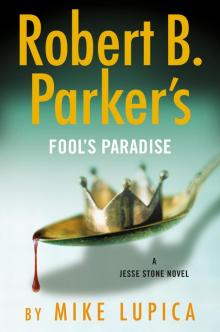 Fool's Paradise
Fool's Paradise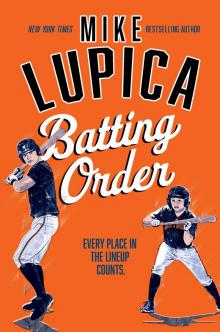 Batting Order
Batting Order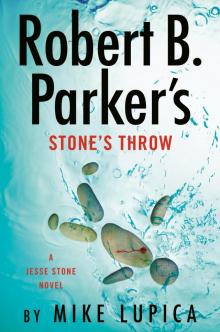 Stone's Throw
Stone's Throw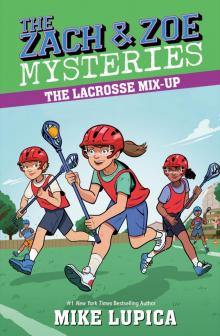 The Lacrosse Mix-Up
The Lacrosse Mix-Up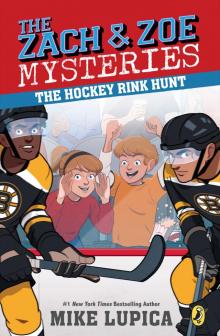 The Hockey Rink Hunt
The Hockey Rink Hunt Payback
Payback Triple Threat
Triple Threat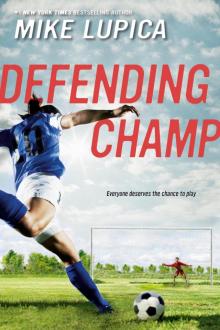 Defending Champ
Defending Champ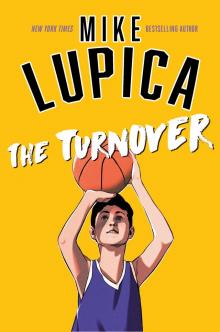 The Turnover
The Turnover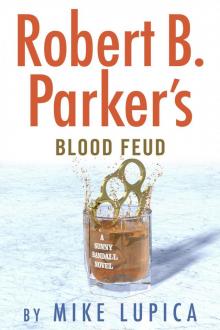 Robert B. Parker's Blood Feud
Robert B. Parker's Blood Feud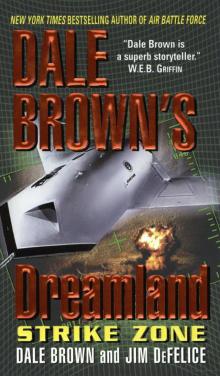 Strike Zone
Strike Zone Hero
Hero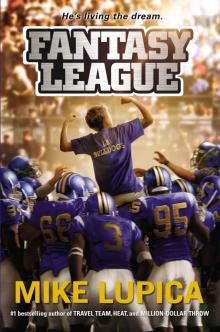 Fantasy League
Fantasy League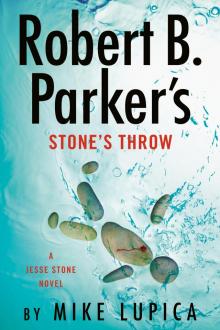 Robert B. Parker's Stone's Throw
Robert B. Parker's Stone's Throw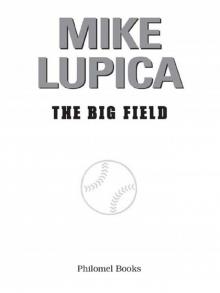 The Big Field
The Big Field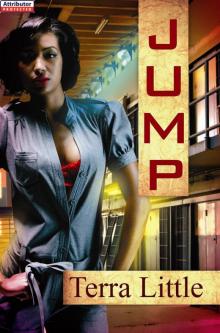 Jump
Jump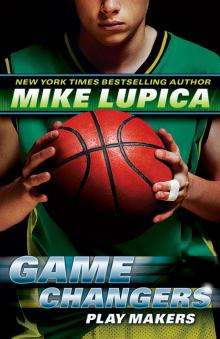 Play Makers
Play Makers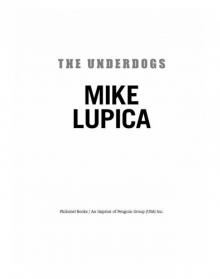 The Underdogs
The Underdogs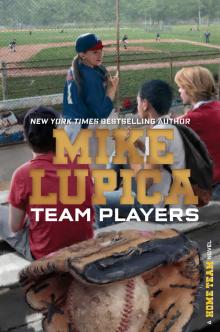 Team Players
Team Players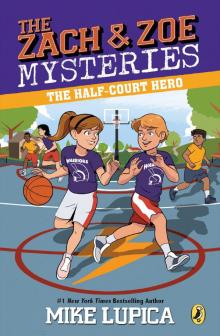 The Half-Court Hero
The Half-Court Hero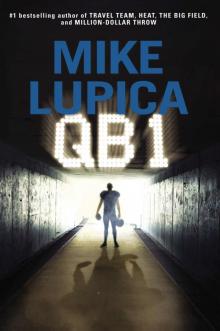 QB 1
QB 1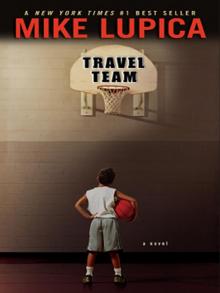 Travel Team
Travel Team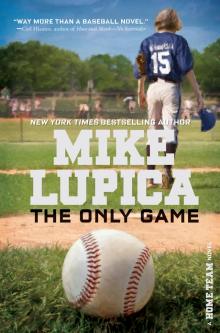 The Only Game
The Only Game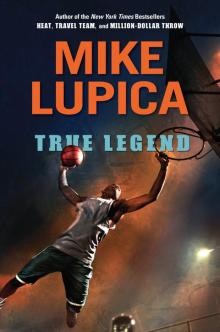 True Legend
True Legend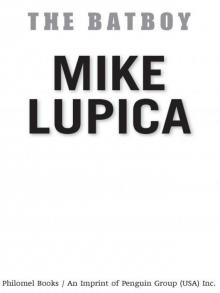 The Batboy
The Batboy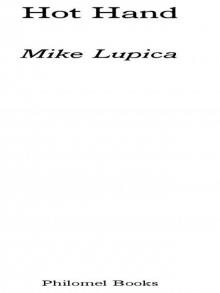 Hot Hand
Hot Hand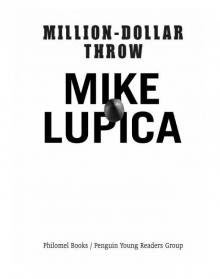 Million-Dollar Throw
Million-Dollar Throw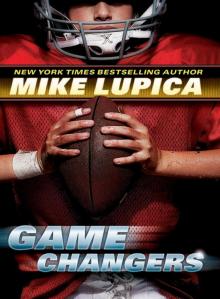 Game Changers
Game Changers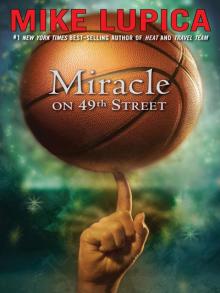 Miracle on 49th Street
Miracle on 49th Street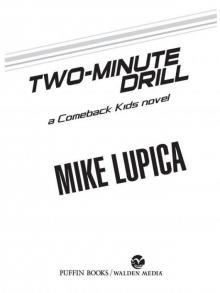 Two-Minute Drill
Two-Minute Drill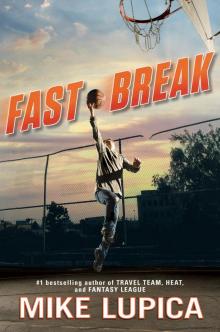 Fast Break
Fast Break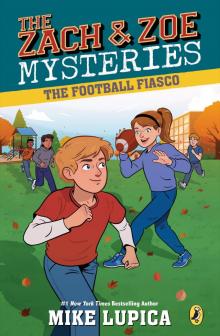 The Football Fiasco
The Football Fiasco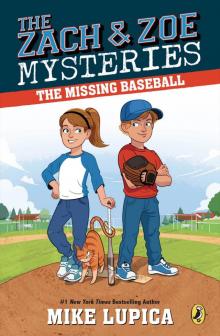 The Missing Baseball
The Missing Baseball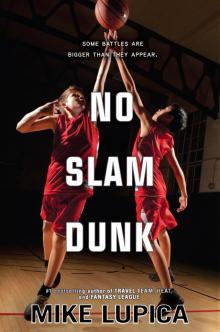 No Slam Dunk
No Slam Dunk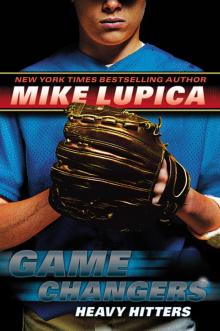 Heavy Hitters
Heavy Hitters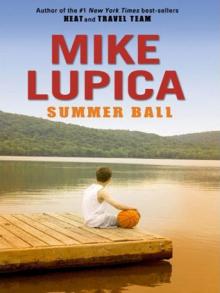 Summer Ball
Summer Ball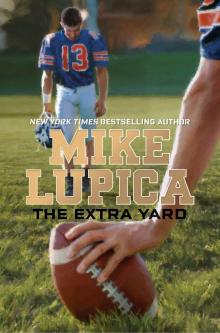 The Extra Yard
The Extra Yard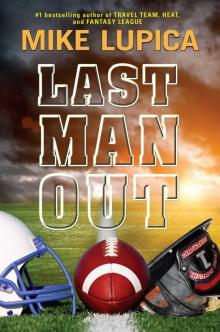 Last Man Out
Last Man Out